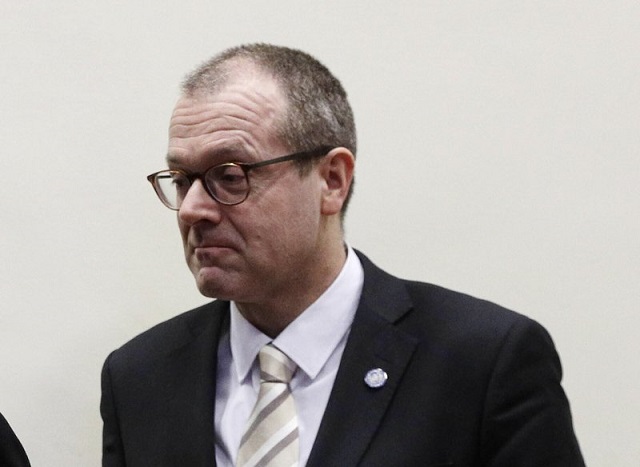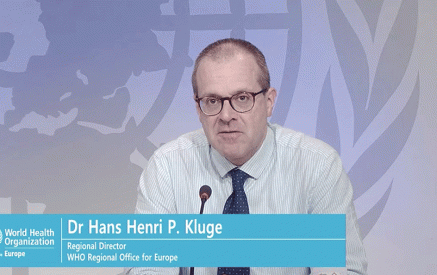We can stop reaching this grim milestone by taking action now, urges WHO/Europe
The European Region remains in the firm grip of the COVID-19 pandemic. Last week, reported deaths due to COVID-19 increased to nearly 4,200 a day, doubling from 2,100 deaths a day during the end of September. Meanwhile, cumulative reported deaths from the virus passed the 1.5 million mark for the 53 countries in this Region. Today, COVID-19 is the number one cause of death across Europe and Central Asia, as reported by the Institute for Health Metrics and Evaluation, who carry out modelling for WHO/Europe.
We can expect that there will be high or extreme stress on hospital beds in 25 countries, and high or extreme stress in intensive care units (ICUs) in 49 out of 53 countries between now and 1 March 2022. Cumulative reported deaths are projected to reach over 2.2 million by spring next year, based on current trends.
“In order to live with this virus and continue our daily lives, we need to take a “vaccine plus” approach. This means getting the standard doses of vaccine, taking a booster if offered, as well as incorporating preventive measures into our normal routines. Taken together, wearing a mask, washing hands, ventilating indoor spaces, keeping physical distance, and sneezing into your elbow are simple, effective ways of gaining control over the virus and keeping societies going. All of us have the opportunity and responsibility to help avert unnecessary tragedy and loss of life, and limit further disruption to society and businesses over this winter season,” said Dr Hans Henri P. Kluge, WHO Regional Director for Europe.
Read also
Factors driving increasing SARS-CoV-2 transmission
The three main factors driving the current high transmission of COVID-19 are:
- The European Region is “Delta dominant” – the Delta variant of SARS-CoV-2 is highly-transmissible, with no country reporting more than 1% of any other variant.
- In recent months many countries have indicated to their populations that COVID-19 no longer represents an emergency threat and have eased measures such as mask wearing and physical distancing in crowded or confined spaces. Now, the weather has turned colder, and people are gathering indoors.
- With a large number of people who are still not vaccinated, and reduced vaccine-induced protection against infection and mild disease, many people are left vulnerable to the virus.
Steps to reduce transmission and stabilize the pandemic in Europe and Central Asia
“As we approach the end of 2021, let’s do everything we can by getting vaccinated and taking personal protective measures, to avoid the last resort of lockdowns and school closures. We know through bitter experience that these have extensive economic consequences and a pervasive negative impact on mental health, facilitate interpersonal violence and are detrimental to children’s well-being and learning,” Dr Kluge commented.
Increase vaccine uptake
The COVID-19 vaccines are a vital tool to prevent severe disease and death and have remained effective despite the emergence of several variants of concern. Vaccination has saved hundreds of thousands of lives, prevented countless hospitalizations, and lessened the strain on health care systems since being introduced less than one year ago. WHO/Europe and ECDC will be releasing further data on this later this week.
Over one billion doses have been given in the WHO European Region, with 53.5% of people having completed their vaccine dose series. However, this hides wide differences between countries, where the range in completed vaccine dose series spans from under 10% to over 80% of the total population.
It is essential that we drive up vaccination rates amongst all those eligible, acknowledging and addressing the reasons why people have not received the vaccine so far, working more closely with behavioral and cultural scientists to understand whether these are systemic barriers to access, or individual and community concerns. The COVID passport, for example, is a collective tool to enable societies and people to continue with regular activities.
Evidence is growing that vaccine-induced protection against infection and mild disease is declining.
It is in this context that a booster dose should be given to protect the most vulnerable, including the immunocompromised, as a priority. Based on the national context of vaccine dose availability and COVID-19 epidemiology, countries should also consider giving a booster dose to those aged over 60 and heath care workers, as a precautionary measure. Specific guidance will be released by the European Technical Advisory Group of Experts on Immunization later this week.
Take personal protective measures
Regular hand cleaning; maintaining physical distance from others; mask wearing; coughing or sneezing into a bent elbow or tissue; avoiding closed, confined, and crowded spaces; and ensuring good ventilation indoors have proven to be effective when used together to prevent COVID-19 infection.
Currently, 48% of people in the Region wear a mask when leaving home, according to self-reported data. A study published last week on the effectiveness of public health measures, suggested that mask wearing reduces COVID-19 incidence by 53%. If from today universal mask coverage of 95% was achieved, it is estimated that over 160,000 deaths could be prevented by 1 March 2022.
As we spend more time indoors this winter, and take part in seasonal gatherings, people should remain vigilant, manage their risk, and take precautions, following effective protective measures. Integrating these measures with public health interventions such as self-isolation and testing, contact tracing and quarantine, maximizes community protection from the virus.
“Today, the COVID-19 situation across Europe and Central Asia is very serious. We face a challenging winter ahead, but we should not be without hope, because all of us – governments, health authorities, individuals – can take decisive action to stabilize the pandemic,” concluded Dr Kluge.




























































